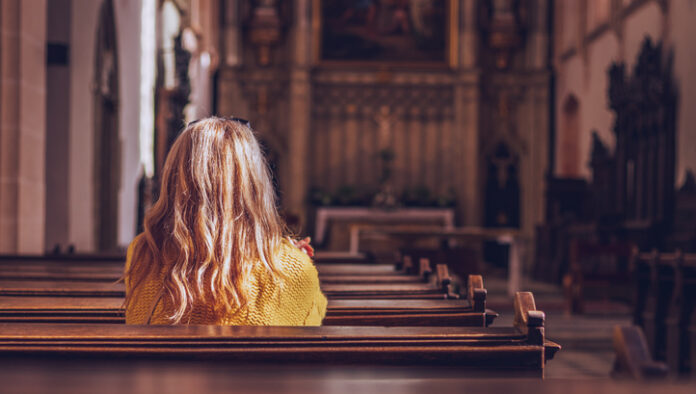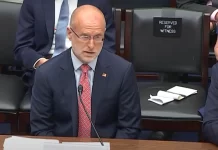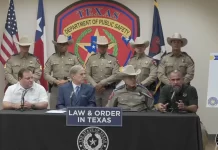By Virginia Allen
There’s no denying that 2020 has been a trying year.
Churches all over the nation closed their doors because of COVID-19. Rioters burned and looted businesses in cities from Portland, Oregon, to Kenosha, Wisconsin. And a contested election has left many Americans concerned for the country’s future.
Amid the trials and tribulations of this year, Becket Law’s annual Religious Freedom Index found that religious liberty is still an essential American value. Becket Law, a nonprofit, public interest legal institute, says its mission is “to defend the free exercise of all faiths, from Anglican to Zoroastrian.”
In a survey of 1,000 Americans, 78% said they believe “religion is important to providing stability to society during times of social unrest,” Becket Law reports in the new index.
Caleb Lyman, director of research and analytics at Becket Law, joins the show to explain Americans’ current view of religious freedom and whether the nation’s perspective on faith has changed during 2020.
Lyman also discusses the survey’s surprising findings regarding how Generation Z (those born between 1997 and 2012) views religion.
We also cover these stories:
-
- Georgia Secretary of State Brad Raffensperger says he will recertify the state’s election results.
- Conservatives push back on former Vice President Joe Biden’s pick to lead the Department of Health and Human Services.
- Federal judges in both Michigan and Georgia dismiss election-related lawsuits from lawyer Sidney Powell.
“The Daily Signal Podcast” is available on Ricochet, Apple Podcasts, Pippa, Google Play, and Stitcher. All of our podcasts can be found at DailySignal.com/podcasts. If you like what you hear, please leave a review. You also can leave us a message at 202-608-6205 or write us at letters@dailysignal.com.
Virginia Allen: I am joined by Caleb Lyman, director of research and analytics at Becket Law. Caleb, welcome to the show.
Caleb Lyman: Glad to be here. Thanks for having me.
Allen: So for the second year in a row, Becket has released a Religious Freedom Index, which is really intended to get a pulse on how Americans are viewing religious liberty in the nation. This index is a massive undertaking. This year’s full report was 90 pages.
So, Caleb, I want to ask you why did Becket Law determine that it was worth the time and it was worth the energy to begin every year producing an index to measure religious freedom?
Lyman: Yeah, there are a couple of reasons. And I think noting that it is a massive report, it makes sense in a year that we had so much going on, both with religious freedom and just everything else going on with the pandemic, social unrest, and the elections. And that’s really what we want to do each year is to get a pulse, like you said, of religious freedom and American sentiment on religious freedom.
And the reason we decided to do the index is because so many of the polls that we saw out there and so much of the work that we saw done, in regards to opinion on religious freedom in America, really missed that broad perspective of the ways that, one, religion interacts with so many aspects of people’s lives and two, the ways that religious freedom goes beyond just the really hot, controversial issues of the year.
So our purpose in making this index is to be able to track changes in American opinion over time in religious freedom. We have polls, of course, on, like I said, the most controversial issues of the year all the time on religious freedom. But the way that those dots are connected from issue to issue and from year to year really wasn’t out there.
So that’s why we decided to do an index instead of just a yearly poll. An index allows us to be able to track those changes year over year. And secondly, we wanted to really get at the breadth and depth of religious freedom and the way that religion interacts with people’s lives. So instead of just doing a couple of issues a year, we try to cover the full scope of religious freedom.
We draw on our 20-plus years of litigation experience to ask questions about not just the issues that we’re familiar with and that are current right now, but issues that have been in the past and issues that are likely to continue in the future with religious freedom.
So it’s an effort to really be able to talk about religious freedom in a way that reflects the way that religion is a nuanced and deep part of people’s lives, and to be able to track those changes over time.
Allen: Religious freedom is always such a relevant topic, no matter what is going on in the world, but this year especially, it’s been on people’s hearts, it’s been on their minds, a major concern I know for many Americans. And … as you mentioned, I love how in the index, you all really take the time to ask Americans their views and their opinions.
So you all conducted a survey where you ask about a thousand Americans 21 different questions regarding their views on religion, on religious freedom in America. And of course, as we’ve said, this has been such a wild year. We’ve seen crazy lockdowns with COVID, churches have been closed. So what did those surveys have to say regarding how important their faith has been to them during the pandemic?
Lyman: This was a really interesting part of the index. So, we had those 21 questions, like you said, and then we asked an additional more than 50 questions about the pandemic and about everything else going on this year to be able to inform those 21 questions that stay the same every year.
So yeah, this year with the pandemic and asking people about how important or not important their faith was, we were really interested to see that 62% of Americans said that their faith had been important to them during the pandemic.
And additionally, a more broad issue there, we asked how important people thought their religion faith was in providing stability during times of social unrest. And even more Americans, more than three-quarters of Americans, said that religion was important to society in providing stability during times of social unrest.
One additional thing that I think was so interesting and really one of the most surprising parts of the index for me was on this question about whether faith is important during the pandemic.
The two groups that were most likely to say that their faith had been important to them during the pandemic were, one, respondents over 65. So I don’t think that’s terribly surprising. Respondents that are older are generally more religious and also more at risk during the pandemic. So I think that makes sense.
But the group that was second most likely and actually even more likely than respondents over 65 to say their faith had been important to them during the pandemic were Gen Z respondents.
So often in the narrative about Gen Z, and younger generations in general, I think, is that their faith is less important to them, that they’re turning away from religion, etc., etc. But in the pandemic, we see that that’s definitely not true. The Gen Z found faith important to them and more important than a lot of other people did.
Allen: That’s really encouraging to hear. There’s hope for the country. That’s good.
Lyman: Yeah.
Allen: Wow.
Lyman: Yeah, definitely.
Allen: Now, you mentioned the issue of social unrest in the country, and I know that you all did specifically ask about racial tensions. Can you tell me a little bit about what you learned from Americans on their view of what we should do about racial unrest and what the role of religion is within that?
Lyman: Yeah, and that was really our focus is, how does religion play into the racial unrest and racial justice in America? Religious groups and communities have historically played a major role, of course, in advocating for racial justice, from the civil rights movement to the original abolitionists, right?
So we asked our respondents what role religion should have in advocating for racial justice and equality. And the answer here was really strong. Eighty-four percent of respondents said that religious organizations should have a role in advocating for racial equality and justice.
But then we also asked a follow-up question to individuals who said that their faith was important to them. So this is a group that we often look at in this survey and we simply call them people of faith. So we asked people of faith what role their faith community had. And only 49% said that their faith community had done a good job in responding to issues of racial equality and justice.
So those were really disparate responses, right? Eighty-four percent of people of faith saying that religion should have a role, but only half thought that their communities had done a good job. So we saw that as a desire for leaders and for religious organizations to step up and fill that role that people of faith think that they should fill.
Allen: Yeah, I think that’s so important to be aware of the fact that Americans see those two things going hand in hand as faith being this profound and important answer to these really current and pressing issues. But there’s obviously still more work that needs to be done. [It’s] really, really helpful to see those numbers laid out.
Compared to last year’s index, did you all find that Americans, would you say, are more or less worried about religious freedom than they were a year ago?
Lyman: On this perspective of a year-to-year change, we see their opinions staying pretty stable, honestly. And that’s good to see. We don’t expect with an index like this that has so many questions and covers such a wide range, we don’t expect to see wide swings in American opinion just from one year to the next.
On individual questions, we certainly see areas where different demographics and groups change their opinion. But I think this was really encouraging in and of itself that in regards to religious freedom as a whole, when it’s presented with the full scope of different religious liberty issues, that Americans’ opinion does stay the same.
Now, the interesting thing here, though, is we just have two years of data and we want to do this and we expect to do this survey and this index every year. And that’s where we’ll really start to get interesting results.
As we get into years three, five, plus, we’ll be able to see how trends develop, not just year-to-year change, but we have this starting point from 2019. And we’ll see where in some areas, we expect some dimensions of the index to grow and support gradually over time. And probably, I think some areas of the index may diminish a little bit, depending on public opinion in general and current events that are going on.
And as we were talking about a minute ago, the big X factor here is Gen Z. As they grow and as they become a larger portion of America, their opinions on religion and religious freedom really are still shaping and really are still forming, and will have a big impact and a growing impact over the years as they become a larger portion of this sample.
So we’re very encouraged to see that their opinions are stable, but very excited to see the dynamics and the changes that will occur moving forward.
Allen: Yeah. And the biggest change that you all saw you say is in the area of religious pluralism. Can you just explain what you mean by that and what that change was?
Lyman: Yeah. So, religious pluralism is one of the six dimensions of the index. So the index is one composite score and it’s the average of six dimensions. So those 21 questions that we were talking about, those are statistically grouped into six dimensions. It’s not like categories that we just made up based on the topics. They’re statistically created … via factor and path analysis, complex statistical analysis.
So religious pluralism is one of those dimensions. And the religious pluralism dimension deals with the ability of people to believe different things about God and to live in society accepting of those different beliefs.
So that was a little concerning that some of the largest change was a dip in just the most basic aspects of religious freedom, people being OK with others being able to believe and live different things in themselves. But at the same time, it’s still the strongest, the highest level of support of any of the dimensions.
Most of the questions, I think possibly all of the questions in this dimension, still saw more than 80% of support. So we’ll definitely watch that dimension next year, in the coming years, because that would be problematic if people are not supporting of religious pluralism.
But even with that slight dip, the only statistical change in any of the dimensions, people are still extremely supportive. If you can get more than 80% support on anything, you’re about as popular as apple pie. So not too worried.
Allen: Were there any major surprises to you all? I mean, you mentioned Gen Z, that’s obviously a really encouraging finding. Were there any other findings that really stuck out to you guys?
Lyman: Yeah. There were two that I think were surprising for me personally. One was in this area of the role of elected officials and the role of religious freedom in people’s decisions of who to vote for.
So 61% of respondents said that a candidate’s stance on religious freedom was important. So I think that was encouraging, to begin with. A majority of people say when they’re going to the ballot box, they’re looking at the candidate’s stance on religious freedom.
When we asked the follow-up question of, “OK, who in the government do you think does a good job of protecting religious freedom?”—since religious freedom is clearly a priority in those voting decisions—I would hope to see elected officials as being the group that people choose to be doing a good job of protecting religious freedom.
However, when we asked the question who respondents thought did the best job of protecting religious freedom, respondents were actually most likely to say that the courts were doing the best job—who are, of course, judges being completely unelected officials. And the second most popular category was just other, which may be elected officials, maybe not.
But the president, state governments, and Congress were least likely to be chosen as those doing a good job of protecting religious freedom. Congress being the lowest.
So that also reflects, I think, general trust in some of those institutions. But given that 61% say that a candidate’s stance on religious freedom was important, I would have liked to see that higher. And then just one other area that I thought was really interesting, another one of our dimensions is religion in action.
So that has to deal with how people live and practice their faith in the workplace. So it’s not just about belief or holding different beliefs like religious pluralism is, but it’s very specific to work context and being able to do or not do work in accordance with your religious beliefs. And it was very encouraging. Baby boomers actually increased their support quite a bit on a lot of those issues by more than 5%.
So last year, we talked about how Gen Z and younger generations are often more supportive of workplace accommodations for religious freedom, and older generations can tend to be a little less supportive. So it was great to see that movement of baby boomer respondents in a more positive direction of being OK with the workplace and people sharing their religious beliefs and practicing their religious beliefs in the workplace. So those are two additional areas that I thought were surprising.
Allen: Yeah. And I just love the fact that you have it so broken down by generation, because it is just really fascinating to see from age group to age group how not only the differences between them, but then how those age groups evolve and change over time. So interesting.
I do want to ask you before I let you go one, I guess, big-picture question. I mean, Becket, of course, you guys are on the forefront of so many critical religious liberty battles. You all represented the Little Sisters of the Poor multiple times as they’ve gone before the Supreme Court. You represented Masterpiece Cakeshop in their fight to not be forced to bake wedding cakes for same-sex couples’ weddings.
So you have a really good pulse on religious liberty issues in America. So with that said, should Americans be concerned about religious freedom in America?
Lyman: That’s a really interesting question. I think the simple answer is Americans should always be concerned for religious freedom because there will always be attacks on religious freedom.
The government will always try to overstep their bounds and try to infringe on people’s rights. But at the same time, I think the encouraging flip side of that is, one, there are people like Becket and many others protecting religious freedom. Our mission isn’t going to change. We’ll always be fighting to defend religious freedom.
And the second part I think that’s very encouraging is that Americans are very supportive of religious freedom. That’s the takeaway that I keep going back to as I’ve looked through this data is that religious freedom really is a unifying principle.
If you get into some of the details of specific cases and the narratives that have been developed around them, it may not seem that way. But when you look at underlying principles, which is a big focus of the index, you really do see that Americans support religious freedom, it’s core to their identity.
For example, I mean, we see that 60% of respondents said that for some people, religion is a fundamental part of who I am, which, if the question ended there would not be that interesting. But goes on to then say, “and should be protected accordingly.” So people see the connection between religion, identity, and protections.
And lastly, on that point of support for religious freedom and people of faith, one of the most also encouraging things that I saw in the data this year is that Americans see people of faith and religion as part of the solution.
So as we started our conversation, you were talking about the crazy year that it is and you have to talk about that and all the problems that Americans in the world have faced, we’re in need of a lot of solutions.
And when asked whether people of faith and religion are a part of the solution, 62% of Americans said that people of faith are part of the solution. And of those who said that people of faith were definitely part of the solution, that category increased actually 7% last year.
So I think in times like 2020, when there are so many problems both of social unrest, etc., and religious freedom, I think it’s really encouraging that Americans look to people of faith, they look to religion for those solutions and they do so in increasing proportions, right? When people of faith are seen as part of the solution, as part of the contribution to what makes America what it is, I think we’re in a good spot.
So I guess the summary there is, yes, religious freedom is always going to be something that we need to defend. But Americans are supportive of it and they see people of faith and religion as part of the solution.
Allen: Lots of reasons to be encouraged. Glad to hear you say that.
Lyman: Yeah.
Allen: Caleb, thank you so much. We encourage all of our listeners to go check out the index yourself. You can visit becketlaw.org/index to read the full report. If you just want the highlights, they have a great one pager up on the website as well. You can just see some of those key takeaways.
But Caleb, I really thank you so much for your time today and telling us about this amazing resource at Becket Law.
Lyman: Thank you. It was great to talk about and great to look back on the year a little bit and have some positive things to share.
Allen: Absolutely.










